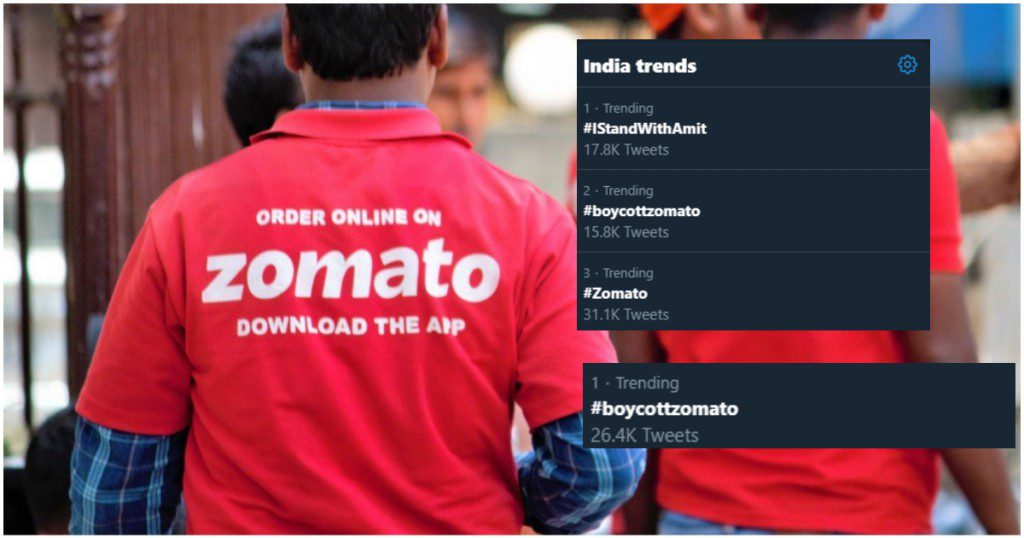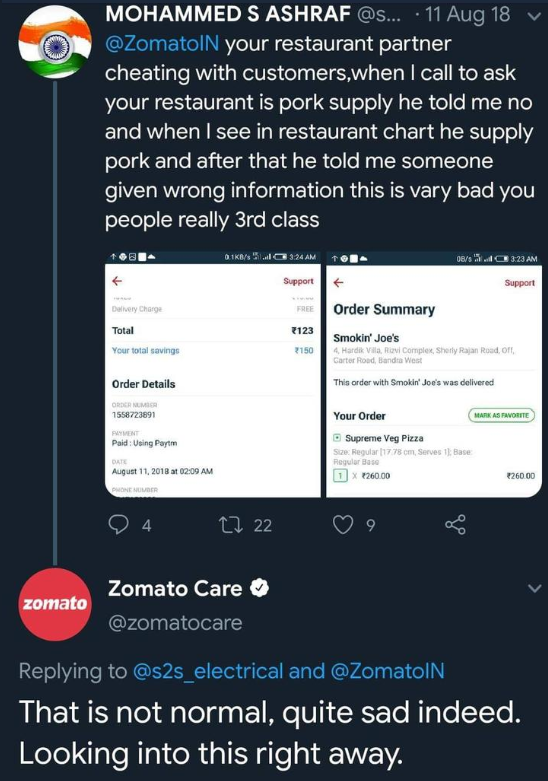Food delivery platform Zomato finds itself in a bit of a soup.
Zomato had earlier earned accolades for publicly calling out a customer who’d wanted a Hindu delivery partner because he was observing the holy month of Shrawan. “Food has no religion. It is a religion,” Zomato had tweeted, and the tweet had gone viral, with customers praising its stand. But two days on, the mood on the internet appears to have decisively shifted.
#BoycottZomato was the top Twitter trend in India two days ago, followed by #IStandWithAmit at number 2. All of yesterday, #ZomatoUninstalled was trending on Twitter, with people sharing screenshots and videos of them uninstalling the Zomato app. These trends have together gathered over 75,000 angry tweets in all, and Zomato’s Play Store Page has been hit with thousands of one-star reviews. How did a simple Tweet go so wrong for Zomato? And what could it have done differently?

1. Publicly shaming a paying customer isn’t the best idea: The customer might not be always right, but that doesn’t mean that corporations get to shame them in public. Zomato could’ve politely told the customer, one on one, that it wouldn’t be possible for them to carry out his request, and the matter could’ve ended there. But instead, Zomato chose to quote-tweet the tweet to its 1.4 million followers. This earned the company some free publicity, but also gave the impression of a billion-dollar corporation taking on a single individual. The internet doesn’t take kindly to bullying, or to big companies punching down, and this was perhaps one of the reasons for the backlash that followed.
2. The internet never forgets: As soon as Zomato posted its now infamous-update, users started digging through its old tweets to figure out how it had responded to similar situations in the past. What they found wasn’t flattering. In the past, Zomato had apologized to customers who’d made that demands that had nothing to do with their own food. When a customer had been irate that the restaurant that he’d ordered from served pork — irrespective of the dish they’d personally ordered — Zomato had called the incident “quite sad,” and privately told them that it would look into the matter. As such replies from Zomato began being retweeted, public outrage against the company grew. Zomato could’ve avoided this by better training its customer service personnel, and have standard responses to such requests.

3. Viral marketing is a double-edged sword: Zomato’s initial response had seemed like quite the zinger — “Food has no religion, it is itself a religion” was a line made for Twitter. It was short, snappy, and a great put down for what Zomato thought was a bigoted customer. But as the tweet became viral, and people began observing it more closely, it was apparent that it didn’t quite hold up to scrutiny. Food, like most other things in India, is inextricably linked to religion, and to claim that it was not so felt ingenuous to some. People were quick to point out that Zomato had tags for restaurants that served Halal meat, which has everything to do with religion. The Halal certification requires that the food “neither is nor consist of or contains any part or matter of an animal that a Muslim is prohibited by Shariah to consume or that has not been slaughtered in accordance with Shariah.” As people began pointing this out, Zomato’s tweet about food having no religion didn’t feel all that clever any more.
4. Nobody likes a hypocrite: Zomato CEO Deepinder Goyal waded early into the controversy. “We are proud of the idea of India – and the diversity of our esteemed customers and partners. We aren’t sorry to lose any business that comes in the way of our values,” he sanctimoniously tweeted after the incident. His tweet got thousands of retweets, but people quickly figured out that Zomato didn’t care as much about its values as seriously as Goyal would have liked people to believe.
Just recently, Zomato had added the LGBTQ friendly tag for its Indian restaurants, claiming that discrimination against homosexual people “goes against Zomato’s core values where there is no place for prejudice and intolerance.” But people quickly pointed out that Zomato runs operations in Qatar, where homosexuality is punishable a seven year prison sentence. Some people wondered why Zomato wasn’t willing to lose business in Qatar, as it was so willing to do in India, over the way of its “values.”
5. Understand your audience: Zomato is fast becoming a pan-India brand. It’s moved away from the urban areas, and now operates in as many as 500 cities across the country. This means that its messaging needs to keep in mind the values and aspirations of its new users — content that might work in its office in Cyber City might not necessarily work as well in Chikmanglur. Zomato’s public pillorying of a man who wanted to observe Shrawan clearly didn’t find favour with a large section of its audience.